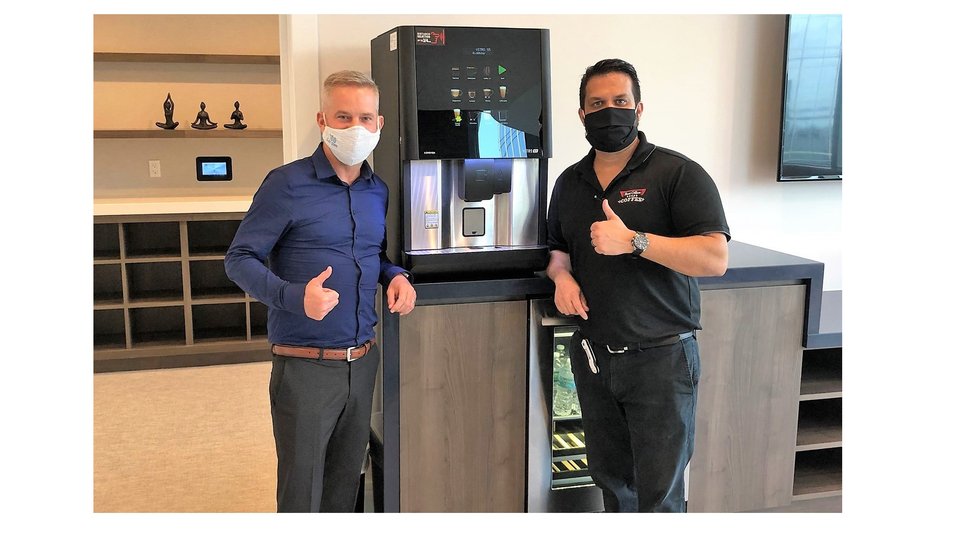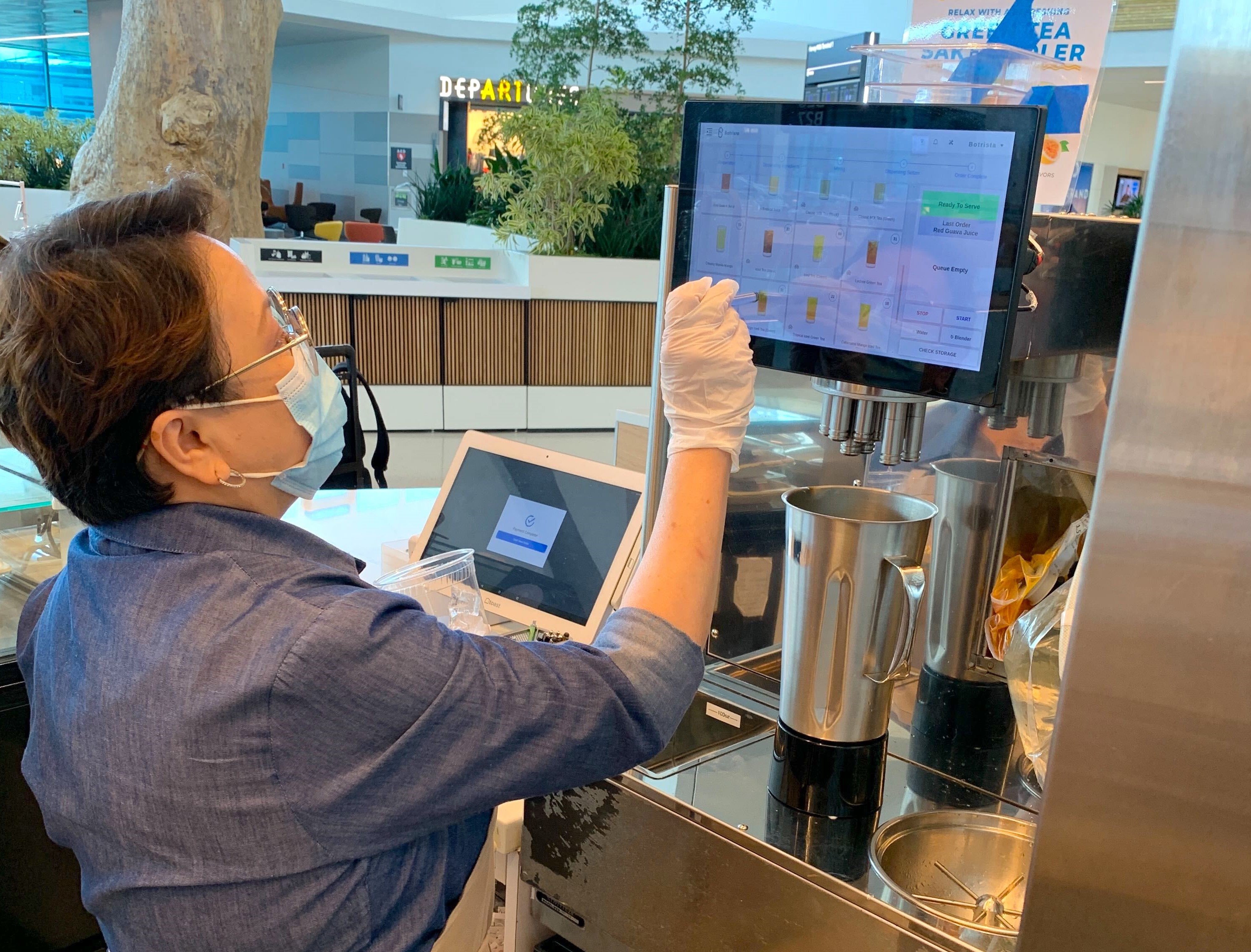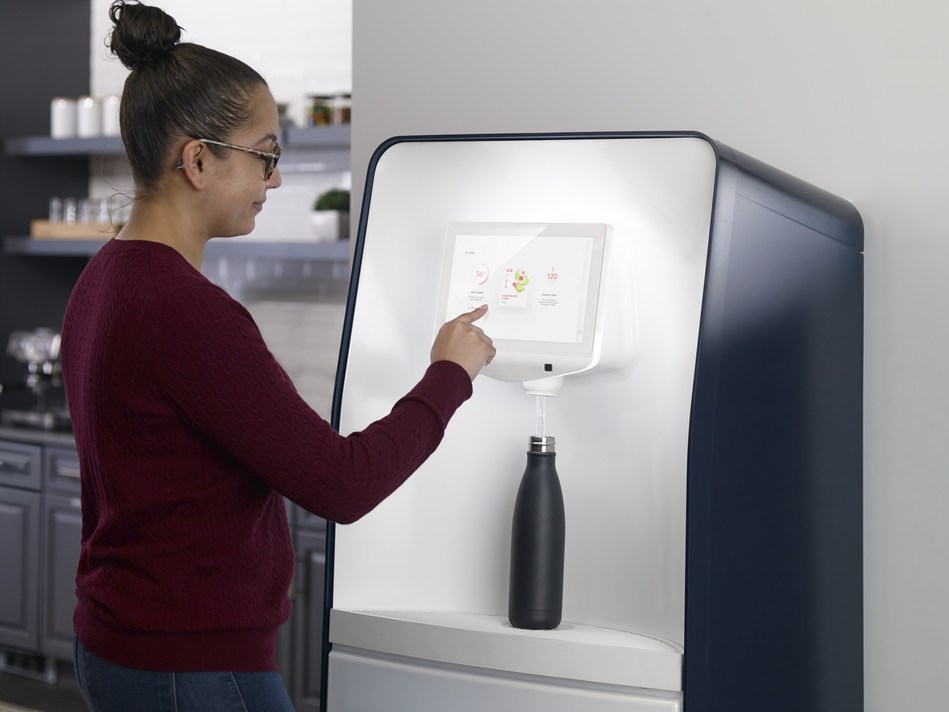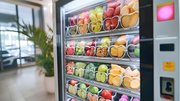Coffee Service
Beverage service in the pandemic era
As convenience services operators work to meet health and safety concerns during the pandemic, the solutions they are discovering will find a receptive customer audience to meet post-pandemic customer needs.

October 28, 2020 by Elliot Maras — Editor, Kiosk Marketplace & Vending Times
The coronavirus pandemic has decimated many worksite populations, forcing convenience services operators to make up the slack in industrial worksites, airports and education facilities. If that weren't challenging enough, many location decision makers have become wary of self-service beverage dispensers and are asking for ways to protect employees and visitors from COVID-19.
As a result, several equipment manufacturers have introduced machines that feature touchless technology.
Best Office Coffee Service Inc., in Miami, has installed nearly 25 Vitro coffee machines from Azkoyen that use "air touch" technology that allows the customer to obtain the products without touching the machine. The user can select the product holding his or her fingers from up to two centimeters from the surface of the selection panel.
"Once customers start seeing that we have an air touch machine, the machine basically does the selling on its own," Albert Gonzalez, area supervisor and sales manager at Best Office Coffee Service, told Vending Times in a phone interview. He considers the machine for locations with at least 50 people.
University hires attendants to serve students
 |
| An employee at Xavier University serves students beverages. Photo courtesy of Xavier University. |
Some locations, like Xavier University in Cincinnati, have added attendants to serve patrons at serving stations instead of having them serve themselves. Attendants serve people beverages from fountain drink machines, Jennifer Paiotti, marketing director for the school's auxiliary services, told Vending Times.
The university expanded its dining staff to serve the students, Paiotti said, with equipment provided by AVI Foodsystems Inc., Pepsi Beverages Co. and Chartwells Higher Education.
Foodservice contractor taps robotic technology
Lady Luck Gourmet, a foodservice contractor based in Burlingame, California, has its employees serving customers Asian juices and teas at a new terminal in the San Francisco airport using a robotic machine that limits the amount of preparation required.
The one-touch Botrista machine mixes juices and teas and allows customers to be served in 15 seconds, said Iva Chen, director of business development and marketing. The attendants prepare the drinks from 20 drink options ranging in price from $5.49 to $6.25. Customers can ask to have the drink customized.
The cloud-based software tracks inventory levels and automatically generates replenishment orders.
 |
| A Lady Luck Gourmet employee uses robotic technology to mix a tea drink at the San Francisco airport, The employee then serves the customer. Photo courtesy of Botrista. |
The robotic machine marks the first beverage serving technology Lucky Lady Gourmet has used, said Chen, who came across the technology at a trade show. The company previously only served bottled beverages.
The Botrista software does not yet integrate with Chen's POS software, Chen said. However, the CloudBar portal allows her team to monitor the sales and inventory in real time.
Fountain machines embrace health and sustainability
While many self-service systems are on hold during COVID-19, convenience services operators are confident the demand will return. When it does, a host of fountain type offerings will be introduced that support both health and sustainability.
The Philadelphia International Airport tested PepsiCo's new hydration system that consists of a hydration dispenser, a companion smartphone app and a personalized QR code sticker for reusable bottles that allows the dispenser to recognize customers.
Jim Tyrrell, the airport's chief revenue officer, told Vending Times the PepsiCo hydration system reduces single-use plastic while allowing consumers to personalize the flavor, bubble and temperature of their water.
 |
| Customers use refillable bottles at the Pepsico hydration machine. Photo courtesy of PepsiCo. |
"With this unit, we can encourage the consumer behavior of traveling with re-usable bottles," Tyrell said. "On top of that, people can record their favorites, set and measure progress against hydration goals, and calculate how many plastic bottles they've saved to date."
This past summer, PepsiCo Inc. expanded its SodaStream consumer brand into away-from-home channels with SodaStream Professional, a mobile-enabled dispenser that allows customers to personalize and digitally track their beverage intake while cutting back on plastic bottles.
PepsiCo officials also pointed to the hygienic benefit: SodaStream Professional pours one tap at a time, limiting contact with other users.
"If PepsiCo can solve consumers' hygiene concern in public areas, the appliance has potential to shape the beverage industry, given that personalization features can drive user satisfaction and that user engagement may build user lock-in to disrupt the current beverage sales channels," Jerrold Wang, an analyst at Lux Research, said in a prepared statement. "Offering a personalized experience, the appliance not only allows users to customize flavors, carbonation levels and temperature in drinks, but also syncs with a phone app to record users' preference, drink history, water intake and daily hydration goals."
Many convenience services operators are also confident they can address both health and safety issues using some of the digital beverage dispensers, such as the Bevi, Lavit and Myx machines that serve water based drinks and eliminate the need for disposable bottles.
"People are moving away from the soda type drinks to more of the water based infusion drinks," Judson Kleinman, founder and CEO of Corporate Essentials in Parsippany, New Jersey, told Vending Times in an interview.
One of his largest accounts replaced two Coca-Cola Freestyle fountain machines with a Myx machine, offering a choice of flavors, still or sparkling water, supplements, calorie intake options and varying degrees of flavor strength. The customer brings their own bottle or cup and orders the size of drink they want, then creates their own drink or picks from one of the featured selections on the touchscreen.
As convenience services operators work to meet health and safety concerns during the pandemic, the solutions they are discovering will find a receptive customer audience to meet post-pandemic customer needs.
For an update on how the coronavirus pandemic affects convenience services, click here.
About Elliot Maras
Elliot Maras is the editor of Kiosk Marketplace and Vending Times. He brings three decades covering unattended retail and commercial foodservice.
 ChatGPT
ChatGPT Grok
Grok Perplexity
Perplexity Claude
Claude






